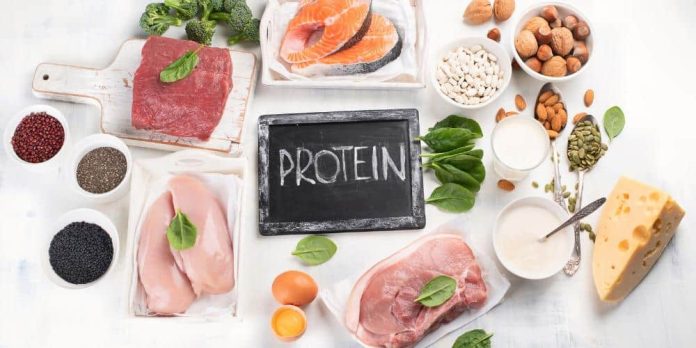The body needs three macronutrients to function properly: carbohydrates, protein and fat. All three of these macronutrients are essential for building muscle and strength. Carbohydrates are the body’s main source of energy.
When you eat carbohydrates, your body breaks them down into glucose, which is then used by your muscles for energy. Eating enough carbohydrates is critical to maintaining high intensity during workouts and post-workout recovery. Protein is the building block of muscle tissue. When you eat protein, your body breaks it down into amino acids, which it then uses to repair and build muscle tissue. Getting enough protein is essential to building muscle mass and strength. Fat is another important macronutrient for building muscle and strength. Fat provides energy and helps absorb vitamins and minerals. They also help keep joints lubricated.
What nutrients are needed for strength and muscle building
Certain nutrients are especially important for strength and muscle building. Here are the most important ones: Protein: Protein is the building block of muscle. In order to build muscle, you need to eat more protein than your body can break down. The best sources of protein are lean meats, poultry, fish, eggs, dairy products and legumes. Creatine: Creatine helps your muscles generate energy during exercise. It helps you gain strength and build muscle mass.
The best sources of creatine are meat and fish. Beta-alanine: Beta-alanine is an amino acid that helps delay fatigue during exercise. It helps you work out longer and gain strength faster. The best sources of beta-alanine are meat and fish. Caffeine: Caffeine is a stimulant that can help you stay alert and focused during exercise. It also helps you work out harder and for longer. The best sources of caffeine are coffee, tea, energy drinks, and supplements.
What Foods to Eat to Build Strength and Muscle
The human body needs three main macronutrients to function properly: carbohydrates, protein and fat. All of these nutrients are essential for muscle growth, but protein is by far the most important. Carbohydrates are the body’s main source of energy and they are necessary for normal muscle function. However, carbohydrates are not as important as protein in building muscle. Protein is essential for muscle growth as it is the main building block of muscle tissue. The body breaks proteins down into individual amino acids, which are then used to build new muscle proteins. Fat is also required for normal muscle function. Fat provides energy for the body and helps absorb some vitamins and minerals. Plus, fat helps keep your skin and joints healthy.
Which Supplements to Take to Build Strength and Muscle
When it comes to strength and muscle building, there are some key supplements that can help you get the most out of your workout routine. Creatine is one of the most popular and well-researched supplements for improving athletic performance. If you’re trying to build strength, consider taking a creatine supplement before your workout. Branched-chain amino acids (BCAAs) are another supplement that is beneficial for strength and muscle building.
BCAAs can help improve athletic performance, reduce fatigue, and promote muscle growth. If you’re interested in taking a BCAA supplement, look for a supplement that contains all three BCAAs: leucine, isoleucine, and valine. Finally, protein powder is a great way to make sure you’re getting enough protein to support Great way to grow muscle. When choosing a protein powder, it’s important to choose one that’s right for your dietary needs and preferences.
How to Create a Nutritional Plan for Strength and Muscle Building
When you’re trying to get stronger and build muscle, you need to make sure your nutritional plan supports your goals. When you’re developing a nutrition plan for strength and muscle building, there are a few key things to keep in mind.
- Eat enough calories: To build muscle, you need to burn more calories than you burn. This means you need to eat more than usual to support your training. A good place to start is to add 500-1000 extra calories per day to your maintenance calorie level.
- Make sure you’re getting enough protein: Protein is the building block of muscle tissue, so getting enough protein in your diet is important. A good rule of thumb is to consume 0.7-1 gram of protein per pound of body weight.
- Eat more healthy fats: Healthy fats are essential for hormone production and other functions in the body. They also help keep you feeling full and aid in calorie absorption. Aim for 20-30% of your daily calories to come from healthy fats.
- Get enough fiber: Fiber aids digestion and also helps keep you feeling full. Aim for 25-35 grams of fiber per day.
- Drink plenty of water: Water is essential to all bodily functions, so it’s important to stay hydrated throughout the day. A good goal is to drink half your body weight in ounces per day.
How to Stick to a Nutritional Plan for Strength and Muscle
Many people believe that in order to gain muscle and get stronger, they need to eat a lot of protein. While protein is important, it’s not the only nutrient that’s critical for strength and muscle building. In fact, if you want to get the most out of your time at the gym, you need to make sure you’re eating a well-rounded diet that includes all the nutrients your body needs to perform at its best. To help you make informed choices, we’ve put together a list of nutritional rules for gaining strength and muscle. By following these rules, you will achieve your fitness goals in no time.
- Eat enough calories In order to build muscle, you need to eat a surplus of calories, which means you need to eat more calories than your body burns in a day. How many calories you need depends on your age, gender, activity level, and muscle-gaining goals. But as a general rule of thumb, if you want to build muscle, you should aim for at least 18 calories per pound of body weight per day. So, if you weigh 150 pounds, you’ll be burning 2,700 calories per day.
- Get Lots of Protein As we said before, protein is important for muscle growth. When it comes to how much protein you need, it depends on your weight and goals. But as a general guideline, the Academy of Nutrition and Dietetics recommends. So if you weigh 0 lbs and want to gain muscle mass slowly, aim for 8 – 1 gram of protein per day; if you want to gain weight quickly during the bulking phase, aim for 150 – 75 grams of protein per day.
- Carbohydrates are important in building muscle for two reasons: they fuel your muscles so they can power through your workout, and they replenish glycogen stores (a type of carbohydrate stored in your muscles) ) to aid post-workout recovery. To ensure your muscles have enough energy to work out and recover properly post-workout, aim for 1-4 grams of carbs per pound of body weight before your workout and 0.5 – 2 grams of carbs immediately after your workout compound. So if you weigh 150 lbs, your carbs would be 150-600 grams pre-workout and 75-300 grams post-workout. Just make sure most of these carbs come from complex carbs like fruits, vegetables, whole grains and legumes, not simple sugars.
- Make sure you get enough healthy fats are important for building muscle because they aid in the production of hormones (necessary for muscle growth), provide energy, support cell membranes, and aid in the absorption of fat-soluble vitamins. When it comes to how much fat you should be eating, it depends on factors like your activity level and goals. But as a general rule, 20-35% of your daily calories should come from fat. So if you’re eating 2,700 calories a day, anything between 540 – 945 calories should come from fat.
Common Mistakes People Make When Trying to Build Strength and Muscle
If you’re trying to get stronger and build muscle, you’re probably making one (or more) of these common mistakes.
- You are not eating enough protein. Protein is a key nutrient for building muscle, so you need to make sure you’re getting enough protein at every meal. Aim for 20-30 grams of protein per meal, and make sure at least some of it comes from whole sources such as poultry, meat, fish, eggs, dairy or tofu.
- You are not lifting enough weight. To build muscle, you need to challenge your muscles by lifting weights. You should be able to lift 80-85% of your weight for a maximum of 8-12 repetitions. If you can lift the weight more than 12 times, it’s time to increase the weight.
- You’re not giving your muscles enough time to recover between workouts. Lifting weights damages your muscles, which is how they get stronger. But in order for them to recover and grow bigger and stronger, you need to give them 48-72 hours of rest between workouts. This means that you should not exercise the same muscle group more than 2-3 times per week.
- You are not eating enough calories. In order to build muscle, you need a calorie surplus, which means you eat more calories than you burn each day. Aim to add 250-500 calories per day above your maintenance level. This will help ensure your body has the energy it needs to support muscle growth. 5. You’re not getting enough sleep. Sleep is when your body recovers and grows from a workout, so getting 7-9 hours of quality sleep every night is important if you want to build muscle and get stronger
The Secret to Nutrition and Strength Training Success
If you want to get stronger and build muscle, you need to focus on two things: lifting weights and eating right. This is because gains in muscle mass come primarily from increased muscle protein synthesis, which is stimulated by exercise and amino acid intake. So if you want to maximize your results, you need to make sure you do both. Here are some tips to help you get the most out of your nutrition and strength training efforts:
- Eat enough protein. Protein is a key nutrient for building muscle, so you need to make sure you’re getting enough of it. The best way to go is to eat 0.7-1 gram of protein per pound of body weight per day.
- Get enough calories. Along with protein, you also need to make sure you’re getting enough calories. If you don’t eat enough calories, your body won’t have the energy it needs to build muscle. Aim for 18-20 calories per pound of body weight per day.
- Lift weights regularly. To build muscle, you need to lift weights on a regular basis. Aim for 3-5 days a week.
- Get enough sleep. Sleep is important for restoring and rebuilding muscle tissue. Aim for 7-9 hours per night.




